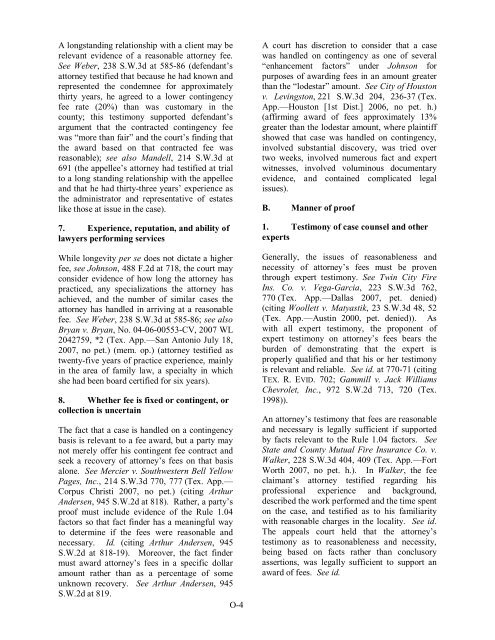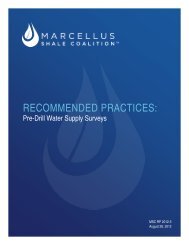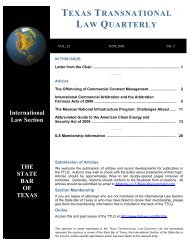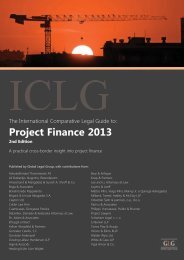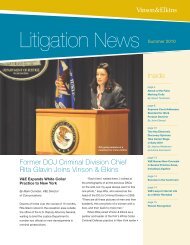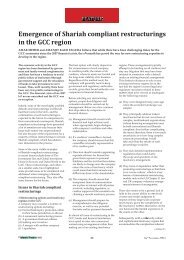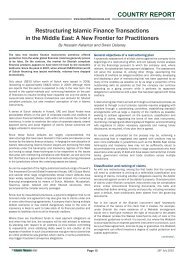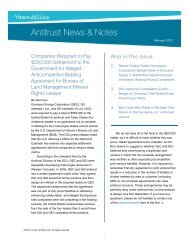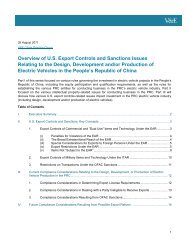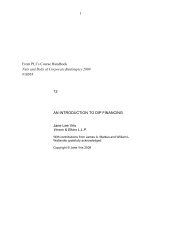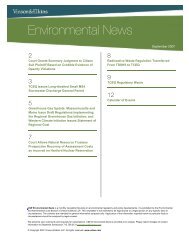Attorney's Fees Update - Vinson & Elkins LLP
Attorney's Fees Update - Vinson & Elkins LLP
Attorney's Fees Update - Vinson & Elkins LLP
You also want an ePaper? Increase the reach of your titles
YUMPU automatically turns print PDFs into web optimized ePapers that Google loves.
A longstanding relationship with a client may be<br />
relevant evidence of a reasonable attorney fee.<br />
See Weber, 238 S.W.3d at 585-86 (defendant’s<br />
attorney testified that because he had known and<br />
represented the condemnee for approximately<br />
thirty years, he agreed to a lower contingency<br />
fee rate (20%) than was customary in the<br />
county; this testimony supported defendant’s<br />
argument that the contracted contingency fee<br />
was “more than fair” and the court’s finding that<br />
the award based on that contracted fee was<br />
reasonable); see also Mandell, 214 S.W.3d at<br />
691 (the appellee’s attorney had testified at trial<br />
to a long standing relationship with the appellee<br />
and that he had thirty-three years’ experience as<br />
the administrator and representative of estates<br />
like those at issue in the case).<br />
7. Experience, reputation, and ability of<br />
lawyers performing services<br />
While longevity per se does not dictate a higher<br />
fee, see Johnson, 488 F.2d at 718, the court may<br />
consider evidence of how long the attorney has<br />
practiced, any specializations the attorney has<br />
achieved, and the number of similar cases the<br />
attorney has handled in arriving at a reasonable<br />
fee. See Weber, 238 S.W.3d at 585-86; see also<br />
Bryan v. Bryan, No. 04-06-00553-CV, 2007 WL<br />
2042759, *2 (Tex. App.—San Antonio July 18,<br />
2007, no pet.) (mem. op.) (attorney testified as<br />
twenty-five years of practice experience, mainly<br />
in the area of family law, a specialty in which<br />
she had been board certified for six years).<br />
8. Whether fee is fixed or contingent, or<br />
collection is uncertain<br />
The fact that a case is handled on a contingency<br />
basis is relevant to a fee award, but a party may<br />
not merely offer his contingent fee contract and<br />
seek a recovery of attorney’s fees on that basis<br />
alone. See Mercier v. Southwestern Bell Yellow<br />
Pages, Inc., 214 S.W.3d 770, 777 (Tex. App.—<br />
Corpus Christi 2007, no pet.) (citing Arthur<br />
Andersen, 945 S.W.2d at 818). Rather, a party’s<br />
proof must include evidence of the Rule 1.04<br />
factors so that fact finder has a meaningful way<br />
to determine if the fees were reasonable and<br />
necessary. Id. (citing Arthur Andersen, 945<br />
S.W.2d at 818-19). Moreover, the fact finder<br />
must award attorney’s fees in a specific dollar<br />
amount rather than as a percentage of some<br />
unknown recovery. See Arthur Andersen, 945<br />
S.W.2d at 819.<br />
O-4<br />
A court has discretion to consider that a case<br />
was handled on contingency as one of several<br />
“enhancement factors” under Johnson for<br />
purposes of awarding fees in an amount greater<br />
than the “lodestar” amount. See City of Houston<br />
v. Levingston, 221 S.W.3d 204, 236-37 (Tex.<br />
App.—Houston [1st Dist.] 2006, no pet. h.)<br />
(affirming award of fees approximately 13%<br />
greater than the lodestar amount, where plaintiff<br />
showed that case was handled on contingency,<br />
involved substantial discovery, was tried over<br />
two weeks, involved numerous fact and expert<br />
witnesses, involved voluminous documentary<br />
evidence, and contained complicated legal<br />
issues).<br />
B. Manner of proof<br />
1. Testimony of case counsel and other<br />
experts<br />
Generally, the issues of reasonableness and<br />
necessity of attorney’s fees must be proven<br />
through expert testimony. See Twin City Fire<br />
Ins. Co. v. Vega-Garcia, 223 S.W.3d 762,<br />
770 (Tex. App.—Dallas 2007, pet. denied)<br />
(citing Woollett v. Matyastik, 23 S.W.3d 48, 52<br />
(Tex. App.—Austin 2000, pet. denied)). As<br />
with all expert testimony, the proponent of<br />
expert testimony on attorney’s fees bears the<br />
burden of demonstrating that the expert is<br />
properly qualified and that his or her testimony<br />
is relevant and reliable. See id. at 770-71 (citing<br />
TEX. R. EVID. 702; Gammill v. Jack Williams<br />
Chevrolet, Inc., 972 S.W.2d 713, 720 (Tex.<br />
1998)).<br />
An attorney’s testimony that fees are reasonable<br />
and necessary is legally sufficient if supported<br />
by facts relevant to the Rule 1.04 factors. See<br />
State and County Mutual Fire Insurance Co. v.<br />
Walker, 228 S.W.3d 404, 409 (Tex. App.—Fort<br />
Worth 2007, no pet. h.). In Walker, the fee<br />
claimant’s attorney testified regarding his<br />
professional experience and background,<br />
described the work performed and the time spent<br />
on the case, and testified as to his familiarity<br />
with reasonable charges in the locality. See id.<br />
The appeals court held that the attorney’s<br />
testimony as to reasonableness and necessity,<br />
being based on facts rather than conclusory<br />
assertions, was legally sufficient to support an<br />
award of fees. See id.


